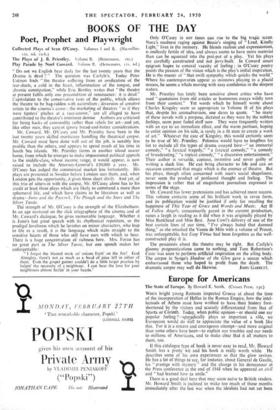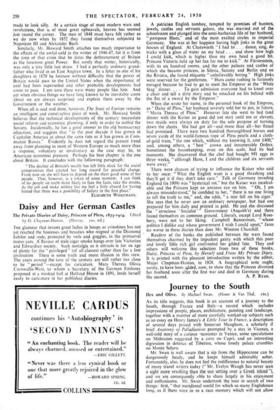Europe for Americans
The State of Europe. By Howard K. Smith. (Cresset Press. Its.) WHEN bright young Romans inspected Greece at about the time of the incorporation of Hellas in the Roman Empire, how the intel- lectuals of Athens must have writhed to have, their history fore- shortened by the visitors and scarcely differentiated from that of Sparta or COrinth. Today, when public opinion—or should one say popular feeling ?—sporadically plays so important a role, we Europeans would do well to appreciate the value of a book like this. For it is a sincere and courageous attempt—and more original than some others have been—to explain our troubles and our needs to millions of Americans, and to make clear that it all matters to them, too.
If this catalogue type of book is never easy to read, Mr. Howard Smith has a pretty wit and his book is really worth while. He describes some of his own experiences so that the glow revives. He has a lot of things ft) say, for instance, about General de Gaulle, his "prestige with mystery" and the change in his demeanour at the Press conference at the end of 194 when he appeared en civil and "had learned how to smile."
There is a good deal here that may seem naïve to British readers. Mr. Howard Smith is inclined to make too much of those months immediately after the-last war when the idealists had not yet been
made to look silly. At a certain stage of most modern wars and revolutions, that is of most great upheavals, heaven has seemed just round the corner. The men of 1848 must have felt rather as we do now when by 1852 they found themselves subjected to Napoleon Ill and Alexander Bach.
Similarly, Mr. Howard Smith attaches too much importance to the effects of the awful cold in the winter of 1946-47, for it is from the time of that crisis that he dates the dethronement of Britain as the foremost great Power. But surely that winter, historically, was only a tiny little last straw. l'had a perfectly ordinary grand- father who lived in an East Anglian town. In a letter to one of his daughters in 1878 he foresaw without difficulty that the power of Britain would pass to the United States when the importance of coal had been superseded and other probable developments had come to pass. I am sure there were many people like him. And yet when obvious things we have long known to be inevitable come about we are always surprised and explain them away by the Government or the weather.
When all is said and done, however, The State of Eur'ope remains an intelligent and constructive piece of work. Mr. Howard Smith believes that the technical developments of the century necessitate social reform and economic planning, if only in order to outbid the Soviets. Incidentally, he has a good answer to the old bureaucracy objection, and suggests that "in the past decade it has grown in Capitalist America at about the same rate as it has grown in Com- munist Russia." Evidently he does not regard the present trend away from planning in most of Western Europe as much more than a response, voluntary or involuntary as the case may be, to American economic pressure. Perhaps his best chapter is the one about Britain. It concludes with the following paragraph: "The decline of Britain's wealth has left little slack for the social compromises that created her long record for peaceful change. From now on she will have to depend on the sheer good sense of her people. That, however, is a token of some moment. I can think of no people on earth more likely to face the facts, take the strains, do the job and make writers like me feel a little absurd for having hinted that there was a possibility of failure in the first place."
ELIZABETH WISKEMANN.



































 Previous page
Previous page